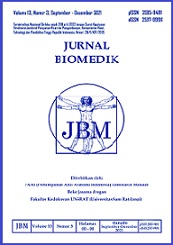PATERNALISME DALAM TINDAKAN MEDIS
DOI:
https://doi.org/10.35790/jbm.2.3.2010.1195Abstract
Abstract: In an ethical context, paternalism means any act that limits someone’s freedom, without his/her consent, for the purpose of either preventing the person from doing himself any harm, or carrying out something positive in a way that can not be achieved by himself/herself. The principle of paternalism must be distinguished from the harm principle. The principle of paternalism says that one’s freedom may be limited if one will inflict the harm on oneself due to one’s attitude, or will not be able to achieve something beneficial for himself/herself. Meanwhile, the harm principle says that someone’s freedom may be limited if the purpose is to protect another person from the harm inflicted by the first party. In medical service sector, paternalism causes conflicts between the principle of beneficence and the principle of autonomy. This is evident if a doctor takes a certain medical action based on the principle of beneficence without giving any information to the competent patient, or the doctor gives the information only to the family. In this situation, there is no informed consent. However paternalism can not cause conflict between these two ethical principles if the patient is not autonomous, so that he/she is not competent to make a decision that can be justified.
Key words: paternalism, patient, doctor, competent
Â
Â
Abstrak: Dalam konteks etika, paternalisme dimaksudkan setiap tindakan yang membatasi kebebasan seseorang tanpa persetujuannya, yang bertujuan mencegah terjadinya kerugian baginya, atau melakukan sesuatu yang baik, yang tidak dapat diperolehnya dengan cara lain. Prinsip paternalisme perlu dibedakan dengan prinsip kerugian. Prinsip paternalisme mengatakan bahwa kebebasan seseorang boleh dibatasi, jika orang itu akan merugikan dirinya sendiri karena kelakuannya sendiri, atau tidak akan memperoleh sesuatu yang sangat baik bagi dirinya. Sedangkan prinsip kerugian mengatakan bahwa kebebasan seseorang boleh dibatasi untuk melindungi orang lain dari kerugian. Di bidang pelayanan medis, paternalisme dapat menimbulkan konflik antara prinsip berbuat baik dan prinsip otonomi bila dokter mengambil tindakan medis tertentu atas dasar prinsip berbuat baik (the principle of beneficence) tanpa memberi informasi kepada pasien yang kompeten, atau hanya menyampaikannya kepada pihak keluarga. Dalam kondisi seperti ini tak ada informed consent atau informed choice dari pihak pasien, dan paternalisme ini tak dapat dibenarkan. Namun terdapat situasi di mana paternalisme tidak menimbulkan konflik antara kedua prinsip etika ini, yakni apabila pasien memang tidak otonom sehingga tidak kompeten untuk mengambil suatu keputusan rasional yang dapat dipertanggungjawabkan.
Kata kunci: paternalisme, pasien, dokter, kompeten
Downloads
Issue
Section
License
Penyunting menerima sumbangan tulisan yang BELUM PERNAH diterbitkan dalam media lain. Naskah yang masuk dievaluasi dan disunting keseragaman format istilah dan cara penulisan sesuai dengan format penulisan yang terlampir dalam jurnal ini.
Segala isi dan permasalahan mengenai tulisan yang yang diterbitkan dalam jurnal menjadi tanggung jawab penuh dari penulis.







